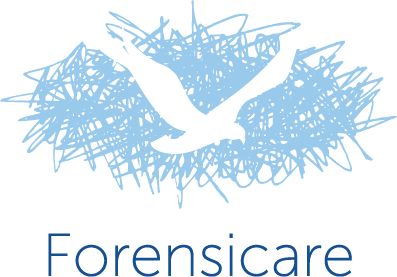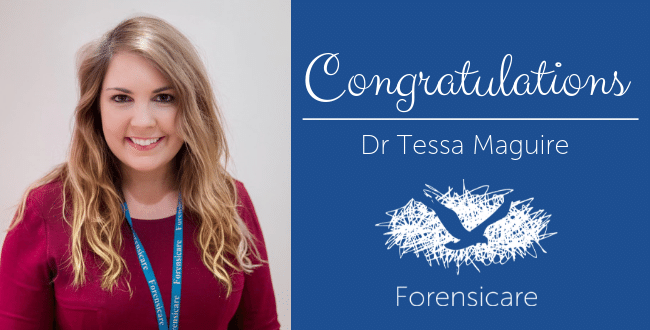Dr Tessa Maguire awarded Doctor of Philosophy on risk assessment and aggression prevention
Forensicare’s very own Tessa Maguire Acting Senior Mental Health Nurse has been awarded her Doctor of Philosophy from Swinburne University—all in record time.
Tess had until 2022 to complete her part-time degree on risk assessment and aggression prevention, but ended up completing it almost three years ahead of schedule.
“I’ve had really fantastic and supportive supervisors and manager,” she said.
“I have been really fortunate to be in this organisation. There’s no way I would have finished my thesis in the amount of time I had if it weren’t for that support.”
Tess’s thesis exploring risk assessment and the DASA
Tess’s thesis, titled Enhancing risk assessment and nursing interventions to prevent aggression and reduce the use of restrictive interventions in forensic mental health units, explored the Dynamic Appraisal of Situational Aggression (DASA). The DASA was originally developed by Forensicare’s Executive Director of Psychological Services Professor Jim Ogloff AM, and Professor of Clinical Forensic Psychology Michael Daffern. Now used primarily by mental health nurses all around the globe, the DASA assesses imminent risk of inpatient aggression. However, despite its effectiveness, the instrument did not provide recommended interventions following a DASA assessment.
In response to these gaps, Tess explored ways to improve the DASA’s effectiveness. Working with Forensicare’s Information and Technology Strategic Manager Chris Guest and Michael Daffern, Tess made adjustments to the DASA to make it easier to use. Known as the eDASA, the electronic version allocates nursing intervention strategies according to the Aggression Prevention Protocol. This protocol was developed in Tess’s first study, and has a focus on early intervention.
The eDASA was trialled on Thomas Embling Hospital’s Barossa Unit, which provides acute and sub-acute treatment to women with mental illness.
The results
“After the trial, results suggested a reduction in verbal aggression and restrictive practices,” Tess said.
“This outcome shows that the DASA, in conjunction with intervention strategies, reduced some types of aggression, reduced the use of PRN medication and reduced the rate of restrictive practices, while improving documentation. As a result, there was an improvement in the safety and well-being of consumers and nursing staff. ”
A clinical foundation in mental health
With over 20 years’ experience in mental health nursing, a key component of Tess’s research projects is identifying industry gaps. After completing her Bachelor of Nursing in New Zealand, she has worked in a variety of settings, including two forensic mental health services in New Zealand, before undertaking a role at Forensicare’s Thomas Embling Hospital in 2002. Now a senior mental health nurse, Tess says it’s her foundation clinical experience that has given her the knowledge of what practice gaps to address with her research.
“I have really enjoyed working with patients over my career, and I am really grateful for the clinical experience I have. It has provided valuable insights for my research.”
Acting Director of Nursing Dr Chris Quinn says the organisation and nursing team is incredibly proud of their newest doctor.
“Tessa’s achievement is a wonderful personal testament to her,” he said.
“She has always been a fabulous role model to our nurses. She supports the learning and professional development needs of nurses, and inspires the nursing workforce to develop the specialist skills they require as forensic mental health nurses.”
Tess’s advice to aspiring researchers
To any nurses aspiring to expand into the field of research, Tess’s advice is to start small.
“I’d recommend a small research project to begin with,” she said.
“From there, if you see things that particularly interest you, or you notice gaps in the field, it’s about having the right conversation with the right people to support you and get you started.”
You can read Tess’s full PhD thesis online.







